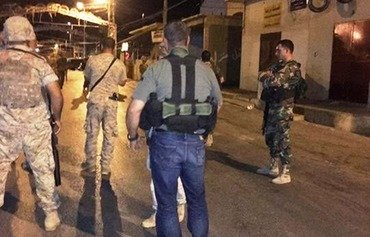Lebanese authorities have vowed to continue to fight terrorism following a series of Monday (June 27th) suicide attacks in the northern border town of al-Qaa.
The Bekaa Valley town came under attack from eight suicide bombers in less than 24 hours, four of whom struck at dawn followed by four more that evening.
The attacks, carried out by eight men in suicide vests, left five military retirees dead and about 25 civilians wounded. The morning attackers detonated their vests on the outskirts of al-Qaa, while the evening attackers targeted Mar Elias Church in the town square, where people had gathered to give their condolences to the families of the five victims of the morning blasts.
Al-Qaa mayor Bashir Matar told Al-Shorfa that four of the suicide bombers were stationed at a house on the outskirts of the town in the early morning hours, and a young man who lived nearby became suspicious of what he saw.
"[The bombers] told him they were members of the army intelligence branch [...] but he did not believe them," Matar said. "After a verbal altercation with them, he opened fire in their direction, prompting one of the suicide bombers to detonate his suicide belt."
Following the explosion, security personnel and other residents rushed to the scene, where the three other bombers blew themselves up in succession.
Later that evening, Matar said, an assailant "on a motorcycle threw a hand grenade into a crowd that had gathered in front of the church, then blew himself up with an explosive belt, followed by the second suicide bomber who did the same".
Two more suicide bombers attempted to attack the same gathering, he said, but an army unit stopped them, and they eventually blew themselves up.
Increased security measures
The attacks prompted the army to bring in reinforcements and conduct a house-to-house sweep of the town, with the co-operation of local residents, while the town’s youth undertook guard duty to support the work of the security agencies.
After inspecting the sites of the bombings, army commander Jean Kahwaji directed military units to tighten security measures at all border crossings and track down suspect elements and arrest them immediately.
He hailed the town of al-Qaa and other border villages as "Lebanon’s first line of defense in the face of terrorism".
The suicide bombers were quick to blow themselves up, Kahwaji noted, which is a "clear testament to the vigilance of the army and residents who foiled their plans".
He stressed that the army "is fully willing and capable of continuing the fight against such terrorism that does not differentiate between one sect and another".
"Any terrorist act, regardless of its size, will not affect the army's resolve to fight terrorism, protect Lebanon and maintain stability," he said.
"The facts revealed by this crime, in terms of number of participants or method of implementation, show the nature of evil harboured for Lebanon and the size of the risks facing the country at this difficult stage both internally and regionally," Lebanese Prime Minister Tammam Salam said in a statement.
"This terrorist operation proves that our stability is targeted by forces of darkness, and that the only way to protect it is by standing united behind our military institution and security forces in their battle against terrorism, and by promoting national unity and strengthening our internal political scene," he said.
Bombers came from al-Raqa
On Wednesday, Interior Minister Nohad al-Mashnouq said the suicide bombers came from al-Raqa, the Syrian stronghold of the "Islamic State of Iraq and the Levant" (ISIL), Lebanon's Naharnet reported.
"Detainees in our custody have identified seven out of the eight bombers who targeted al-Qaa," al-Mashnouq said in an interview on al-Jadeed television, noting that the detainees were shown pictures of the attackers' faces.
"According to the detainees' confessions, the seven criminals came from Syria, specifically from al-Raqa, not from the encampments" of the Syrian refugees in al-Qaa's outskirts, the minister added.
"This is not an assumption," he said. "They came to carry out this specific attack and they were not residents of al-Qaa."
"Touristic sites frequented by Westerners are the locations that the terrorists were seeking to target, according to the confessions," al-Mashnouq said.
"The terrorism that struck al-Qaa is similar to what took place in the southern suburbs and other areas of Lebanon in past periods," al-Qaa MP Marwan Fares told Al-Shorfa. "There are no boundaries to terrorism; it strikes all regions and sects."
The terrorism of ISIL "has no religion or colour", Fares added.
Noose tightening in Syria
"The arrival of the army after the first explosion startled the other terrorists, so they blew themselves up because they could not escape," said military strategy expert Brig. Gen. Naji Malaeb.
Pending the results of the investigation, Malaeb said, "this was an organised attack and certainly involved planners, follow-up operatives and implementers".
"It is likely that they were waiting for someone to transport them to the planned site of their acts of terrorism, and therein lies the danger, as foiling it does not mean it has ended," he added.
Malaeb said the attack is a consequence of Syria's war, adding that ISIL wants to move the battle to either Lebanon or Jordan as the noose is tightening around it in Syria.

![A series of suicide bombings struck the Lebanese border town of al-Qaa on Monday (June 27th). [Photo courtesy of al-Qaa municipality]](/cnmi_am/images/2016/06/30/5704-Lebanon-qaa-attack-600_384.jpg)




